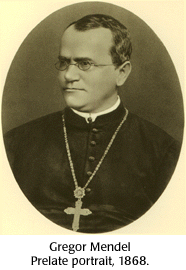Concept 2 Genes come in pairs.
Johann Gregor Mendel (1822-1884)
The Man, the Monk

Johann Gregor Mendel was born in the Silesian village of Heinzendorf, now Hyncice in the Czech Republic. His parents were peasant farmers and very early on recognized their son's intellect. Mendel was able to stay in school and pursue an academic life. His sister, Theresia, actually sacrificed part of her dowry so that Mendel could get an education.
In 1843, Mendel entered the Augustinian Monastery in Brno (in what is now the Czech Republic) as a novice. In his autobiography, Mendel said that unlike other clerics, he didn't feel called to the Church: "my circumstances decided my vocational choice." Mendel did have a good life at the monastery; he was part of the cultural and scientific circles of the area. Also, the monastery sent him to school to continue his education.
Mendel had many interests, and while at the University of Vienna (1851-1853) he studied physics under Christian Doppler, and took courses in chemistry and zoology. As part of his monasterial duties, Mendel taught high school science at the local schools, and was remembered as a kind and good teacher.
The genetic experiments Mendel did with pea plants took him eight years (1856-1863). He published his results in 1865, and his laws of genetic inheritance earned him his place in history as the Father of Genetics.
Throughout the years, Mendel served the monastery loyally, and in 1868, Mendel became the Abbot, prelate of the Brno monastery. His responsibilities as prelate meant that Mendel had less time to spend on his scientific investigations. Mendel took his prelateship seriously; he was aware of the debt he owed to the monastery for supporting his scholarly interests. In the last decade of his life, Mendel became embroiled in a civic dispute about the taxes being levied on the monastery. The dispute caused ill-feeling between the monastery and the civic authorities and was not settled during Mendel's life.
There now exists in Brno a Mendel museum where his life is remembered.


In later years, Mendel smoked up to 20 cigars a day, in part because he liked the taste and also because his doctor told him it would help him lose weight.

What if Mendel did not join the Augustinian order and did not become a monk?
 Children resemble their parents.
Children resemble their parents. Genes come in pairs.
Genes come in pairs. Genes don't blend.
Genes don't blend. Some genes are dominant.
Some genes are dominant. Genetic inheritance follows rules.
Genetic inheritance follows rules. Genes are real things.
Genes are real things. All cells arise from pre-existing cells.
All cells arise from pre-existing cells. Sex cells have one set of chromosomes; body cells have two.
Sex cells have one set of chromosomes; body cells have two. Specialized chromosomes determine sex.
Specialized chromosomes determine sex. Chromosomes carry genes.
Chromosomes carry genes. Genes get shuffled when chromosomes exchange pieces.
Genes get shuffled when chromosomes exchange pieces. Evolution begins with the inheritance of gene variations.
Evolution begins with the inheritance of gene variations. Mendelian laws apply to human beings.
Mendelian laws apply to human beings. Mendelian genetics cannot fully explain human health and behavior.
Mendelian genetics cannot fully explain human health and behavior.